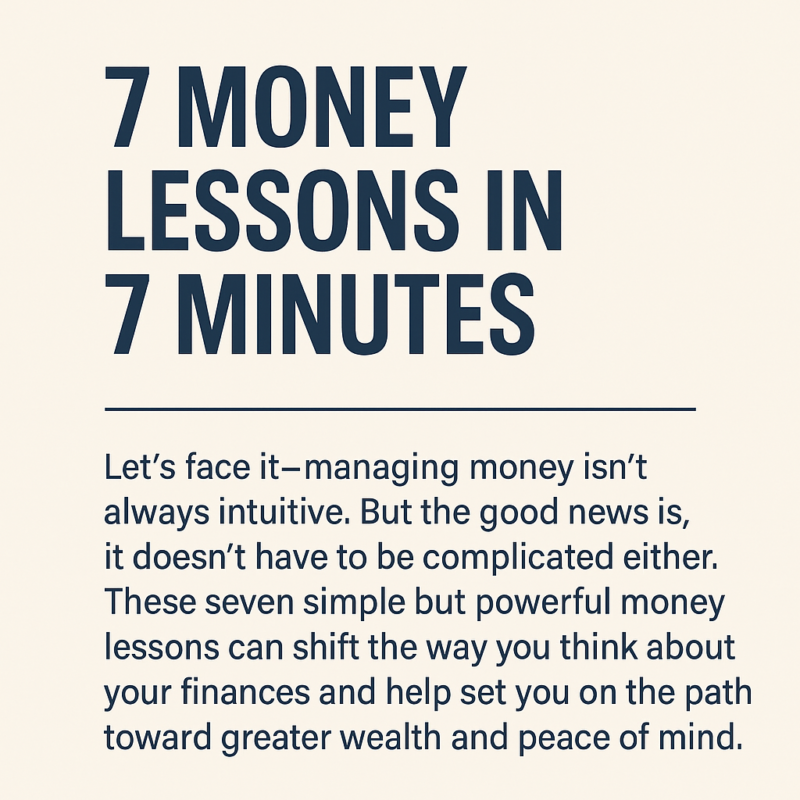Let’s face it — managing money isn’t always intuitive.
But the good news is, it doesn’t have to be complicated either.
These seven simple yet powerful money lessons can shift the way you think about your finances and help set you on the path toward greater wealth and a more peaceful mind.
So, let’s jump in.
1. Know Where Your Money’s Going — Always
It sounds basic, but you’d be surprised how many people genuinely don’t know where their money goes each month.
They earn well, but come month-end… where did it all go?
Start by tracking everything — yes, everything — for at least a month.
Whether it’s that $4 coffee, your streaming subscriptions, or sneaky Uber Eats orders, write it down.
Better yet, use a budgeting app - you’ll quickly spot spending leaks.
And here’s the thing — awareness breeds change.
When you see those numbers in front of you, it’s far easier to make smarter decisions. This isn't about guilt — it's about clarity.
2. Your Money Mindset Matters More Than You Think
Here’s something most financial advisors don’t talk about enough: your attitude toward money.
If deep down you believe “money is the root of all evil” or “rich people are greedy,” guess what?
You’ll subconsciously push wealth away.
Wealthy people tend to believe that money is a tool — a resource to build security, freedom, and generosity.
Cultivating a healthy money mindset means reframing those internal scripts.
Instead of “I can’t afford that,” try “How could I afford that?”
This one shift can move you from limitation to possibility — and that’s where all opportunity begins.
3. Pay Yourself First — Like You’re Your Most Important Bill
This is one of those timeless wealth-building principles, but too many ignore it.
If you wait until the end of the month to save what’s “left over,” spoiler alert: there’s rarely anything left.
Instead, treat your savings like a non-negotiable bill.
As soon as your income hits your account, siphon off a set percentage — say, 10% or 20% — into a separate savings or investment account.
Automate it. Make it invisible. And don’t touch it.
Over time, this becomes a habit — and that habit becomes your safety net, your investing fund, and eventually, your ticket to financial freedom.
4. Set a Clear Savings Target — and Make It Realistic
“Save money” is a goal, sure. But “Save $1,000 a month for the next 12 months to build a $12,000 buffer” is a plan. Big difference.
Figure out what you’re saving for — an emergency fund, a deposit on an investment property, paying off credit cards — and reverse-engineer how much you’ll need and how long it’ll take.
As financial author David Bach suggests, if you’re in your 30s, try saving 10–15% of your income. If you’re older and behind, aim higher. The key is consistency, not perfection.
And remember, don’t be disheartened if you can’t start big. Even $50 a week adds up to $2,600 in a year. The habit is more important than the amount at first.
5. Use Debt Strategically, Not Emotionally
Let’s be honest — debt gets a bad rap, but not all debt is equal.
Yes, credit card debt and payday loans are financial quicksand — avoid them like the plague. But strategic debt, like borrowing to invest in income-producing assets (say, property), can actually accelerate wealth if managed wisely.
So ask yourself: is this debt helping me grow my wealth, or is it helping me buy something I can’t afford and probably don’t need?
One useful trick is to always think about the cost of money — not just the interest rate, but the opportunity cost too.
What’s that debt really costing you in lost investment opportunities or peace of mind?
6. Get On the Same Page as Your Partner
Money conflicts are one of the top causes of relationship stress and breakdowns.
Why? Because most couples never truly align on their financial goals, spending habits, or long-term plans.
If you’re in a relationship, set aside time regularly to talk about money — openly, and without judgement.
Discuss your shared goals, your individual habits, and how you’ll handle decisions together.
You don’t need to be identical in your money styles — but you do need mutual respect and transparency. W
hether it’s joint accounts, splitting bills, or planning for kids and retirement, having these conversations upfront saves stress down the road.
7. Life Happens — That’s Why You Need an Emergency Fund
An emergency fund isn’t optional — it’s essential. Because let’s be real: unexpected bills will happen. Whether it’s a medical emergency, job loss, or your car suddenly deciding to die, you’ll thank yourself for being prepared.
Ideally, set aside enough to cover 3–6 months of living expenses.
Yes, that might take time — but start somewhere. Even $1,000 in a separate high-interest savings account is a great first milestone.
This fund is your financial pressure release valve.
It keeps you from reaching for the credit card when life throws a curveball — and that’s how you stay in control.
Final Thoughts: Money Is a Habit, Not a Mystery
Building wealth doesn’t come from a single clever investment or windfall — it comes from thousands of little decisions made consistently over time.
These seven lessons are simple, but powerful. They’re not about being frugal to the point of misery — they’re about being intentional.
Track your money. Believe you can grow your wealth. Save before you spend. Use debt wisely. Talk openly. Be prepared.
Get these fundamentals right, and you’ll be miles ahead of most people — because financial success isn’t about luck. It’s about habits.
If you’d like help putting these ideas into practice, or want a strategic plan tailored to your goals, have a complimentary chat with a Metropole Sealth Strategist. Click here to lock in a time
It could be the most profitable conversation you have this year.















